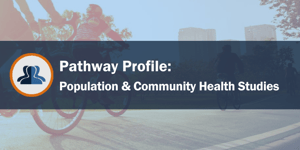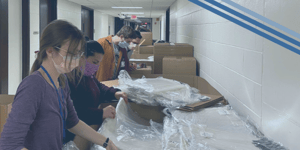The center’s leadership recognized the unbreakable connection between housing and good health. The problem? There was no entry point for the women they served in the current housing support system. The cost of opening and operating a shelter was out of reach, so the center’s leadership looked at a more sustainable solution: change the system to work better for these women, and for the community as a whole.
To create this change, the Benedict Center sought out the Advancing a Healthier Wisconsin Endowment, which was accepting applications through a funding pathway dedicated to challenging and changing the systems that impact health.
The Policy and Systems Change Pathway is one of four dedicated pathways through which AHW issues funding awards and capacity-building programming.
While additional AHW pathways aim to promote health education and workforce development, advance scientific research and discovery, and produce evidence and action through population and community health studies, the policy and systems change pathway focuses on supporting community-led projects to impact health issues at their root causes.
“Changing the systems that impact our health is critical to making healthy choices practical and available to all,” said Maureen Busalacchi, AHW Policy and Systems Change Program Manager. “If we can support a community in making a particular system work for the most vulnerable among us, the result is that the health of everyone in our community – and our state – benefits.”
Today, with funding support from AHW, the Benedict Center has built partnerships that are working to expand the Milwaukee housing support system to better serve as a foundation to good health for those who weren’t served before.
“As a health funder, we recognize that we need to look upstream from today’s health outcomes and improve the systems that drive how we live, work, learn, play, and receive health care,” said Christina Ellis, AHW program director overseeing AHW’s commitment to community-led change. “Through this pathway, we aim to catalyze longer-lasting change across the state.”
“I like to think of it as building something that is sustainable to address one complex challenge impacting health so that we can go on to the next problem,” said Busalacchi. “And, importantly, creating systems change means working to assure that the good, positive impacts don’t go away after the funding is finished – it continues.”
Busalacchi helps each coalition walk the path to create systems changes – with a focus on addressing disparities in health outcomes.
“Systems are what hold inequities in place,” said Busalacchi. “But systems can also be shifted to ensure equity. That is what we want to see.”
AHW’s Policy and Systems Change Pathway today has invested nearly $15 million in community-led projects that are creating change both within communities and across the entire state.
The pathway is supporting a growing number of projects in addressing community-specific needs that range from reducing the long-term impact of witnessing violence on Milwaukee children to establishing a community-based system to prevent suicide in Fond du Lac County, while also supporting statewide changes such as establishing a system to promote high-quality care at free and charitable clinics, developing and then expanding adoption of patient-friendly prescription labels, and expanding immunization access at pharmacies.
While funded projects vary in their particular focus, they each come back to the AHW mission: To improve the health of people in Wisconsin.
“These projects are focused on how to create the best outcomes in health and well-being for people impacted,” said Busalacchi. “I can’t think of a better reason to create change than that.”





